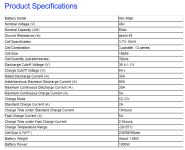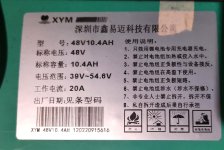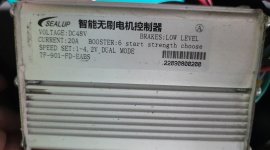Haxerflaxer
1 mW
Hey everyone!
I'm a mechanical engineer who recently got access to a full metal workshop and is interested in building my own scooter for traversing to and from work.
My idea is to do a similar look to the newly released 'Husqvarna - Skutta', or 'Husky - Skutta'. The construction is no problem, however the electric, more the battery in question, is. I'm looking at a 48v, 1000w hubwheel with a drum brake. The seller has a motor controller rated 48v, 1000w and 38A current limiting. When calculating range, speed and etc I've come to the conclusion that a 48v, 15Ah battery would work and a 20Ah would be most optimal. However, most batteries I've seen, within a reasonable price, doesn't have a continuous discharge of 40A and when asking Chatgpt, regarding what would and what wouldn't work, it says a battery with 20-25 continuous discharge would suffice. From what I've read on this site, and others, it seems a tad bit low. Even if magic smoke would perhaps look cool and floor heating would bring the electric scooter to a new level, I'd rather keep it on the safe side.
Is it best to focus on having more or the same amount of continuous discharge rate as the controller and therefore go for a controller with a lower current limiter or is it okay to have a battery with lower continuous discharge, but can have instantaneous 40A? There aren't a lot of hills here, but it's in a city, so I would have quite a few stop lights.
Thanks in advance!
I'm a mechanical engineer who recently got access to a full metal workshop and is interested in building my own scooter for traversing to and from work.
My idea is to do a similar look to the newly released 'Husqvarna - Skutta', or 'Husky - Skutta'. The construction is no problem, however the electric, more the battery in question, is. I'm looking at a 48v, 1000w hubwheel with a drum brake. The seller has a motor controller rated 48v, 1000w and 38A current limiting. When calculating range, speed and etc I've come to the conclusion that a 48v, 15Ah battery would work and a 20Ah would be most optimal. However, most batteries I've seen, within a reasonable price, doesn't have a continuous discharge of 40A and when asking Chatgpt, regarding what would and what wouldn't work, it says a battery with 20-25 continuous discharge would suffice. From what I've read on this site, and others, it seems a tad bit low. Even if magic smoke would perhaps look cool and floor heating would bring the electric scooter to a new level, I'd rather keep it on the safe side.
Is it best to focus on having more or the same amount of continuous discharge rate as the controller and therefore go for a controller with a lower current limiter or is it okay to have a battery with lower continuous discharge, but can have instantaneous 40A? There aren't a lot of hills here, but it's in a city, so I would have quite a few stop lights.
Thanks in advance!




